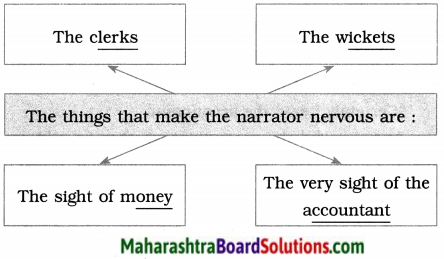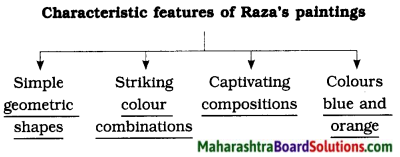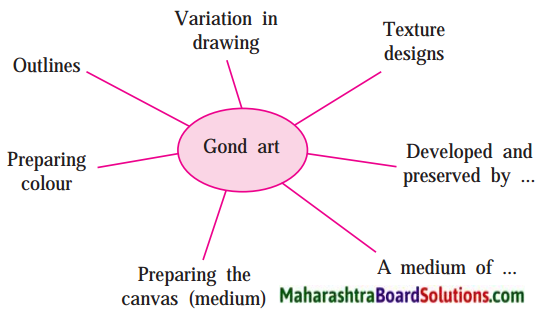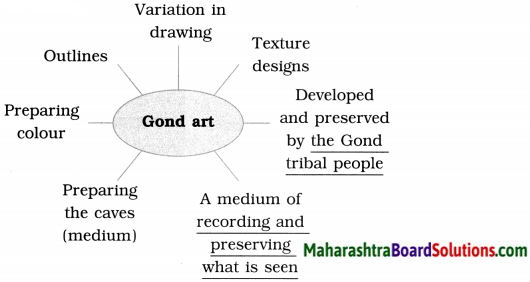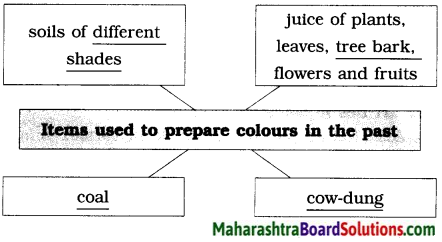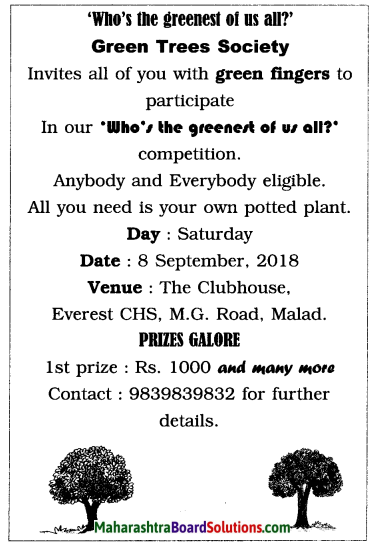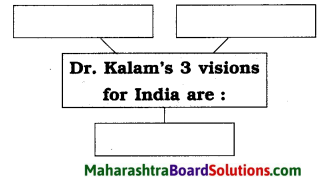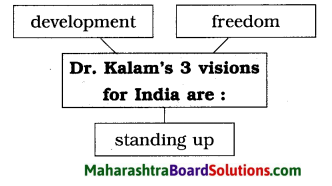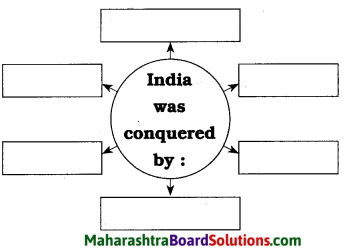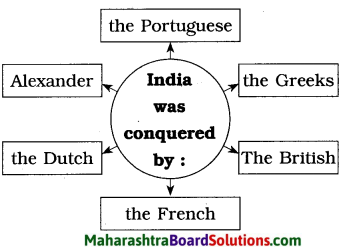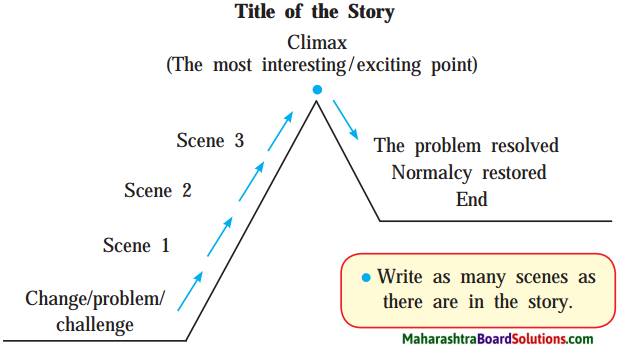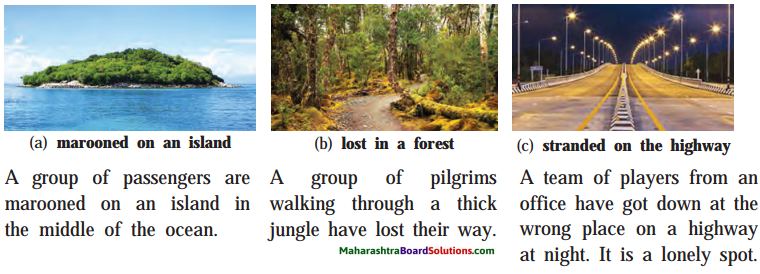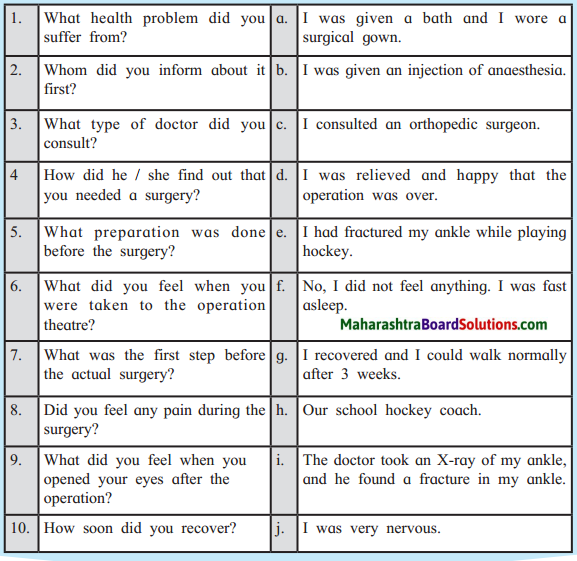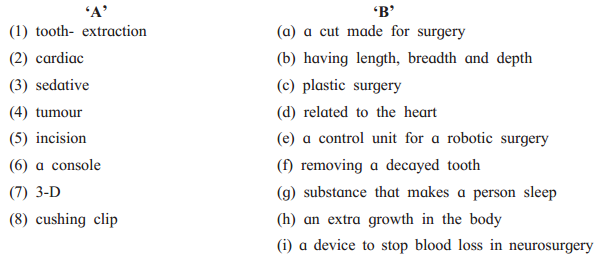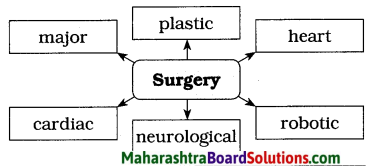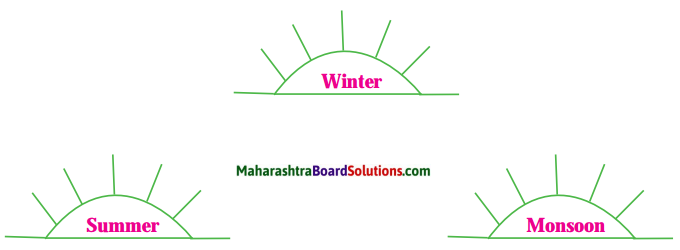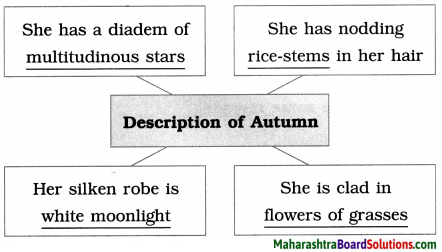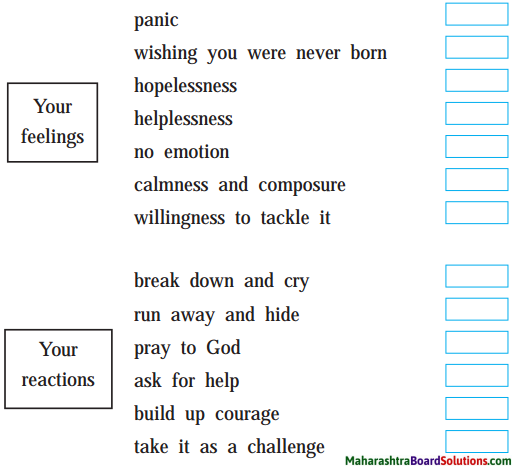Balbharti Maharashtra State Board Class 9 English Solutions Kumarbharati Chapter 4.3 Intellectual Rubbish Notes, Textbook Exercise Important Questions and Answers.
Class 9 English Chapter 4.3 Question Answer Maharashtra Board
Intellectual Rubbish 9th Std Question Answer
Warming Up:
1. How will you react in the following situations?
Question (a)
Your Science teacher tells you plants exposed to the sunlight grow faster than those always in the shade.
………………………………………………………………………………
………………………………………………………………………………
………………………………………………………………………………
Answer:
Points: change the location of your plants – disbelieve her, try some experiments, etc.
Question (b)
Your aunt tells you not to go for a job interview because it’s a no moon day, that very same day.
………………………………………………………………………………
………………………………………………………………………………
………………………………………………………………………………
Answer:
Points: you ignore her words – you listen to her words – you ask for proof etc.
Question (c)
Your friend argues with you that Mount Everest is not the highest peak in the world.
………………………………………………………………………………
………………………………………………………………………………
………………………………………………………………………………
Answer:
Points: you pity his ignorance – you believe him – you look up the internet to check, etc.
Question (d)
A stranger at your door claims to be a magician and promises your mother to turn all her silver jewellery into gold.
………………………………………………………………………………
………………………………………………………………………………
………………………………………………………………………………
Answer:
Points: you slam the door – you call the police – you try to trick him, you give the gold, etc.

2. What do you notice about the following pairs of words?
Question (a)
What do you notice about the following pairs of words?
- act naturally
- liquid gas
- open secret
- sound of silence
- sweet sorrow
- original copy
- only choice
- growing smaller
Answer:
They are all contrasting pairs of words used together. Such contrasting pairs of words that go together are called Oxymorons.
Now try to add a contradictory word (Oxymoron) to the following:
Question (a)
What a ……………… mess you’ve got us into!
Answer:
What a wonderful mess you’ve got us into!
Question (b)
It’s a …………… imitation of a diamond necklace.
Answer:
It’s a genuine imitation of a diamond necklace.
Question (c)
My trip to Matheran was a …………. holiday.
Answer:
My trip to Matheran was a working holiday.
Question (d)
With such heavy makeup, she looks ……………. ugly.
Answer:
With such heavy make-up, she looks pretty ugly.

Question (e)
A ……………. crowd gathered to see the magic show.
Answer:
A tiny crowd gathered to see the magic show.
Note:- Contrasting words that go together are examples of the language device called Oxymoron.
English Workshop:
1. The following expressions are a combination of a noun preceded by a describing word.
Replace the describing words with as many others as you can, that go with the underlined nouns.
eg. silly mistake, grave mistake, careless mistake, obvious mistake etc.
Question (a)
fatal mistake
Answer:
silly mistake, grave mistake, careless mistake, obvious mistake.
Question (b)
foreign customs
Answer:
established customs, local customs, traditional customs, age-old customs.
Question (c)
unappetizing diet
Answer:
nutritious diet, healthy diet, unhealthy diet, strict diet, balanced diet, staple diet, vegetarian diet.
Question (d)
plentiful supply
Answer:
sufficient supply, regular supply, continuous supply, irregular supply.

Question (e)
simple device
Answer:
complicated device, expensive device, helpful device, useless device, clever device, ingenious device, safety device.
Question (f)
savage controversy
Answer:
raging controversy, bitter controversy, unending controversy, fierce controversy.
Question (g)
modern technique
Answer:
new technique, conventional technique, advanced technique, simple technique.
Question (h)
foolish custom:
Answer:
quaint custom, ancient custom, Indian custom, accepted custom.
2. Use the following idioms/expressions in sentences of your own.
Question (a)
to be prone to …………………………………
Answer:
We are prone to infections during monsoon.
Question (b)
to have a difference of opinion ………………………
Answer:
If you have a difference of opinion with someone, you must settle it amicably.

Question (c)
to go beyond …………………………….
Answer:
The fight between the two women was going beyond the limits of decent behaviour.
Question (d)
to have a beneficial effect ……………………………………
Answer:
Exercising regularly has a beneficial effect on the body.
Question (e)
to have a bias ………………………………
Answer:
We should not have a bias against foreign ideas.
Question (f)
to undo ……………………………………..
Answer:
“Do not undo all the good that I have done,” said the psychiatrist to the woman.
Question (g)
to be wary of ………………………………..
Answer:
One should be wary of schemes which promise to make one rich overnight.
Question (h)
under the influence ……………………………….
Answer:
He committed the crime when he was under the influence of alcohol.
3. Say ‘WHY’?
Question (a)
One should avoid getting angry about a difference of opinion.
Answer:
One should avoid getting angry about a ; difference of opinion because if one gets angry, it will show that one’s belief is going beyond what the evidence indicates or states.

Question (b)
The writer found his stay abroad very profitable.
Answer:
The writer found his stay abroad very profitable because it helped him to become aware of foreign ideas and customs and diminish the intensity of his insular prejudice.
Question (c)
The writer grew less dogmatic and more open-minded.
Answer:
When the writer was young, he lived for some time outside his country. He became aware of foreign ideas and customs. This made him grow less dogmatic and more open-minded.
Question (d)
Men declaring that they are saints write letters to the writer.
Answer:
The writer is a renowned person. The men who declare themselves as saints want the writer to mention them in his lectures so that they get some free publicity. Hence they write letters to the writer.
Question (e)
The writer claims that all false beliefs need not be replaced by cold science.
Answer:
The writer claims that all false beliefs need not be replaced by cold science because if this is done, the world would lose some of its interest and variety.
4. Make sentences of your own to show the difference of usage of the following words:
Question (a)
1. device
2. devise
Answer:
1. Today, we make use of various devices to help us.
2. Mothers must devise ways of keeping their children out of mischief.

Question (b)
Make sentences of your own to show the difference of usage of the following homophones :
1. advice
2. advise
Answer:
1. It is very easy to give advice but difficult to follow it.
2. The teacher advised the girl not to waste time.
Question (c)
Make sentences of your own to show the difference of usage of the following homophones:
1. practice
2. practise
Answer:
1. Dowry is an evil practice prevalent in India.
2. I have to practise every day if I want to win the dance competition.
5. When a family member is very ill for long, the grandmother of the family urges everyone to send for a person who claims he can cure victims of black magic. Compose a dialogue with her, in which her granddaughter politely convinces her that she should not believe in such things.
Question 1.
When a family member is very ill for long, the grandmother of the family urges everyone to send for a person who claims he can cure victims of black magic. Compose a dialogue with her, in which her granddaughter politely convinces her that she should not believe in such things.
Answer:
- Grandmother: What a situation! Now that you have tried all your fancy modern medicines, listen to me. Call Cureybaba.
- Granddaughter: Who is he? Never heard of him.
- Grandmother: I am certain that your mother is the victim of black magic. Cureybaba will cure her. You saw him at our neighbour’s house a few days back. He is bald and …
- Granddaughter: Grandma, for Heavens Sake! Mom was ill, no doubt, but her illness has been diagnosed and it is easily curable! There are plenty of medicines in the market.
- Grandmother: She’s been ill for so long now! Granddaughter: Oh, Grandma, only for two months! The diagnosis took long.
- Grandmother: Cureybaba will cure her in one sitting.
- Granddaughter: Listen, Granny dear, these people are all frauds. If your Cureybaba was so good, why doesn’t he get some hair on his head – we know he wears a wig – or cure his horrible cough? Why doesn’t he cure his own mother who is so ill? And has he cured that poor little girl next door? No, he hasn’t. He’s a fraud, Granny.
- Grandmother: But … but, ……….
- Granddaughter: Granny, there’s no such thing as black magic. You know that full well. You have seen enough of these ‘babas’ being exposed. Then why ………….
- Grandmother: Oh, OK. If you say your mother’s 5 illness can be cured by modern medicines easily, I will forget Cureybaba and black magic. Now that I come to think of it, our other neighbour was telling me how he cheated somebody the other day ……….
- Granddaughter: There you are, Granny!

6. List the various ways of avoiding error 1 mentioned in the passage.
Question 1.
List the various ways of avoiding error 1 mentioned in the passage.
Answer:
The various ways of avoiding error are:
- make observations yourself
- make yourself aware of your bias
- be on your guard when you find yourself getting angry about a difference of opinion.
7. Answer the following questions:
Question (a)
If an opinion contrary to your own makes you angry, what does it indicate?
Answer:
If an opinion contrary to my own makes me angry, it indicates that I am subconsciously aware of having no good reason for thinking as I do.
Question (b)
What are the most savage controversies about?
Answer:
The most savage controversies are about ! those matters as to which there is no good evidence either way.
Question (c)
What are the benefits of travel?
Answer:
Travelling helps you to become aware of foreign ideas and customs. You begin to accept them and get rid of your own narrow outlook.
Question (d)
Is the influence of foreign customs always beneficial?
Answer:
No, not always. Very often, the influence of foreign customs can be harmful and we must be cautious while following them.

Question (e)
What are the advantages of an imaginary argument with a person having a different bias?
Answer:
The advantage of an imaginary argument with a person having a different bias is that it is not subject to the limitations of time and space. One can have this argument at any time and at any place.
Question (f)
Why should one be wary of opinions that flatter one’s self-esteem?
Answer:
One should be wary of opinions that flatter one’s self-esteem because there may be opinions with abundant evidence to prove the exact opposite to what one believes.
Question (g)
How does fear lead us to error?
Answer:
Fear leads us to error by making us do things like inventing rumours of disaster in wartime, imagining objects of terror, such as ghosts, or by creating belief in something comforting, like the elixir of life, or heaven for ourselves and hell for our enemies.
Question (h)
Write down the way of avoiding error mentioned in the passage.
Answer:
The way of avoiding error mentioned in the passage is to try to conquer fear.

8. What is the meaning of ‘intellectual rubbish’?
Question 1.
What is the meaning of ‘intellectual rubbish’?
Answer:
This is an oxymoron, where the writer has used contrasting or contradictory words that go together. The writer uses the phrase to describe all false beliefs, baseless opinions, dogmatism, fears and superstitions of various kinds. People follow certain beliefs, ideas and customs without inquiring into their validity. Sometimes, many of these beliefs and customs lead to evil and suffering in the world.
9. Find the opposites of the following:
Question 1.
Find the opposites of the following:
- cautious
- dogmatic
- contrary
- savage
- beneficial
- reasonable
- hypothetical
- cruelty
- immune
Answer:
- cautious × reckless (incautious)
- dogmatic × open-minded
- contrary × same
- savage × mild
- reasonable × unreasonable
- hypothetical × real
- beneficial × harmful
- cruelty × kindness/compassion
- immune × vulnerable

10. Write an imaginary dialogue contesting opposite views on a topic of your choice, e.g. ‘Girls should learn to do all the housework and not boys.’
Question 1.
Write an imaginary dialogue contesting opposite views on a topic of your choice, e.g. ‘Girls should learn to do all the housework and not boys.’
Answer:
- Topic: Girls should learn to do all the housework and not boys
- Myself: Mom, what is this? Why should I learn to do the housework, and not Rohan?
- Mom: You are a girl. Girls have to look after the ! house.
- Myself: Why? Don’t boys live in a house?
- Mom: A woman can look after a home better than a man.
- Myself: That’s ancient history, Mom! Haven’t you heard of something called gender equality?
- Mom: These new-fangled notions of yours!
- Myself: And these notions of only girls having to do housework are all man-made. Look at the west – men and women both do housework. (… and so on. Students can complete this imaginary dialogue.)
(Some topics for imaginary dialogues: should school students be permitted to bring cell phones to school/should coaching classes be banned/should the weight of school bags be monitored/should there be entrance exams for professional courses/should i there be uniforms in schools and colleges.)
English Kumarbharati 9th Digest Chapter 4.3 Intellectual Rubbish Additional Important Questions and Answers
Simple Factual Activity:
Question 1.
Complete the following statements:
Answer:
- Thinking that you know when in fact you don’t is a fatal mistake.
- If the matter is one that can be settled by observation, you must make the observation yourself.
- Many matters are less easily brought to the test of experience.
- Most of mankind has passionate convictions on many matters.

Complex Factual Activities:
Question 1.
What erroneous notion did Aristotle have? What does his example convey to you?
Answer:
Aristotle had the erroneous notion that women had fewer teeth than men, when in fact he didn’t verily it. His example conveys to us that we must be cautious. We must not think that we know something for sure till we make the observation ourselves.
Activities based on Contextual Grammar:
Question 1.
Underline the pronouns in the following sentence:
I believe myself that hedgehogs eat black beetles, because I have been told that they do.
Answer:
I believe myself that hedgehogs eat black beetles, because I have been told that they do.
Question 2.
Rewrite the sentence replacing the gerund with an infinitive:
Thinking that you know when in fact you don’t is a fatal mistake.
Answer:
To think that you know when in fact you don’t is a fatal mistake.
Personal Response:
1. What do you feel when:
Question (a)
Someone opposes your strong belief.
Answer:
I generally get angry but later on I think about it and try to analyse the whole issue.

Question (b)
Someone insists that 2 + 2 = 5.
Answer:
I merely laugh at him/her or feel pity at his/her ignorance.
Simple Factual Activity:
Question 1.
Write if the following statements are True or False:
Answer:
- The writer lived in many countries in his youth – True
- It was a Chinese custom for the women to have small feet – True
- The Manchus followed the Chinese custom – True
- Travelling increases the intensity of insular prejudice – False
Complex Factual Activities:
Question 1.
How can you prevent yourself from developing a dogmatic attitude?
Answer:
You can prevent yourself from developing a dogmatic attitude by becoming aware of opinions held in social circles different from your own.

Question 2.
List the various ways of avoiding error mentioned in the passage.
Answer:
The various ways of avoiding error are:
1. become aware of opinions held in social circles different from your own
2. travel, and if you cannot, seek out people with whom you disagree and talk to them.
2. Use the following idioms/expressions in a sentence of your own.
Question 1.
to become aware of:
Answer:
I became aware of the bear only when it growled loudly.
Question 2.
Find the opposites of the following :
1. diminishing
Answer:
1. diminishing × increasing
Activities based on Contextual Grammar:
Question 1.
Replace the gerund in the following sentence with an infinitive:
It is a good way of ridding yourself of certain kinds of dogmatism.
Answer:
It is a good way to rid yourself of certain kinds of dogmatism.

Question 2.
Frame a Wh-question to get the underlined part as the answer:
This reflection should generate a certain caution.
Answer:
What should generate a certain caution?
Personal Response:
Question 1.
Do you think that traveling helps us to become more tolerant and understanding?
Answer:
Yes, it certainly does. It shows us the way different people live, their ideas and customs, the difficulties they face and the way they solve these difficulties. It gives us a much broader view of life.
Simple Factual Activity:
Question 1.
Complete the following web:
Answer:
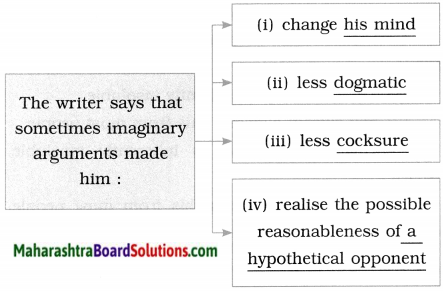
Complex Factual Activities:
Question 1.
Write down the way of avoiding error mentioned in the passage.
Answer:
The way of avoiding error mentioned in the passage is to have imaginary arguments with people having different bias.
Activities based on Vocabulary.
Question 1.
good plan
Answer:
cunning plan, thoughtful plan, well-made plan, secret plan, master plan, career plan.

Activities based on Contextual Grammar:
Question 1.
It is a good plan to imagine an argument with a person having a different bias. (Rewrite the sentence beginning ‘Imagining
Answer:
Imagining an argument with a person having a different bias is a good plan.
Question 2.
You may never meet anyone who holds this opinion. (Rewrite the sentence as a simple sentence.)
Answer:
You may never meet anyone with/having this opinion.
Personal Response:
Question 1.
Have you ever had an imaginary argument with anyone?
Answer:
Yes. I often have an imaginary argument with my mother. In my imagination, she asks me why have got peor marks in some particular subject and I reply. Then she says something else and I counter that one as well. We argue. I Imagine what she well say and provide the answers.
Simple Factual Activity:
Question 1.
Fill in the blanks:
Answer:
- Be wary of opinions that flatter your self-esteem.
- We are all persuaded that our own nation is superior to all others.
- We try to show that the merits possessed b our nation are really important ones.
- We think that the demerits of our own country are comparatively trivial.

Complex Factual Activities:
Question 1.
What two examples does the writer give to those who have opinions that flatter their self-esteem?
Answer:
The writer says that if a man points out that most poets and men of science are male, a woman can say that most criminals are also male. The second example he gives is that of general human conceit. For this, we need to remind ourselves that other parts of the cosmos may contain beings as superior to ourselves as we are to Jelly-fish.
Question 2.
What is the only way to tackle such self-pride?
Answer:
The only way to tackle such self-pride is to remind ourselves that man is a brief episode in the life of a small planet In a little corner of the universe, and that other parts of the cosmos may contain beings as superior to ourseLves as we are to Jelly-fish.
Question 3.
Why should one be wary of opinions that flatter one’s self-esteem?
Answer:
One should be wary of opinions that flatter one’s self-esteem because there may be opinions with abundant evidence lo prove the exact opposite to what one believes.
Question 4.
Write down the way of avoiding error mentioned in the passage.
Answer:
The way of avoiding error mentioned in the passage Is to be wary of opinions that hatter your self-esteem.
Use the following Idioms/expressions in sentences of your own….,
Question 1.
to deal with:
Answer:
The lawyer had to deal with a large number of court cases.

Question 2.
Give the noun forms of the following:
- flatter
- abundant
- rational
- argue
Answer:
- flatter – flattery
- abundant – abundance
- rational – rationality
- argue – argument
Activity-based on Contextual Grammar:
Question 1.
Rewrite the following sentences adding question tags:
1. The question is inherently insoluble.
2. Self-esteem conceals this from most people.
Answer:
1. The question is inherently insoluble, isn’t it?
2. Self-esteem conceals this from most people, doesn’t it?

Personal Response:
Question 1.
Do you think that there are living beings superior to man in other parts of the universe?
Answer:
Yes, I do. The universe is so huge. There is probably a whole lot of life elsewhere that is superior to us. There may also be a lot of life inferior to us, too. We should not make the mistake of thinking that ; we are the greatest.
Simple Factual Activity:
Question 1.
Write whether the following statements are Right or Wrong:
Answer:
- Fear has many forms. Right
- Fear operates directly and indirectly. Right
- You must never admit your own fears to yourself. Wrong
- We can become wise only when we conquer fear. Right
Complex Factual Activities:
Question 1.
What two evils does fear lead to? How can one overcome fear?
Ans.
Two evils that fear leads us to are superstition and cruelty. One can overcome fear by firstly admitting one’s own fears to oneself and then guarding oneself against their myth-making power.
Complex Factual Activities:
Question 1.
What two evils does fear lead to? How can one overcome fear?
Answer:
Two evils that fear leads us to are superstition and cruelty. One can overcome fear by firstly admitting one’s own fears to oneself and then guarding oneself against their myth-making power.

Question 2.
How does fear lead us to error?
Answer:
Fear leads us to error by making us do things like inventing rumours of disaster in wartime, imagining objects of terror, such as ghosts, or by creating belief in something comforting, like the elixir of life, or heaven for ourselves and hell for our enemies.
Activity-based on Vocabulary:
Question 1.
Match the adjectives in Column A with the nouns in Column B:
| A |
B |
| 1. specific |
(a) effort |
| 2. vague |
(b) terrors |
| 3. difficult |
(c) beliefs |
| 4. religious |
(d) fear |
Answer:
- specific – terrors
- vague – fear
- difficult – effort
- religious – beliefs.
Activities based on Contextual Grammar:
Question 1.
Fear is the main source of superstition. (Rewrite beginning ‘It is ……………)
Answer:
It is fear that is the main source of superstition.

Question 2.
Until you have admitted your own fears to yourself, you cannot hope to think about other matters. (Rewrite using ‘only when
Answer:
Only when you have admitted your own fears to yourself, can you hope to think about other matters.
Personal Response:
Question 1.
What are the things you are afraid of?
Answer:
I am generally afraid of things regarding my education. I am afraid that I will not do well in my j exams and not get a seat in the college of my choice. I am also afraid that I will be separated from my friends and will not be able to make new friends at a new place. I will be lost without friends.
Simple Factual Activity:
Question 1.
Fill in the blanks:
Answer:
1. Primitive magic has the purpose of securing safety either by injuring enemies or by protecting oneself by talismans, spells or incantations.
2. Neither a man nor a crowd nor a nation can be trusted to act humanely or to think sanely under the influence of a great fear.
Complex Factual Activities:
Question 1.
What is the aim of primitive magic?
Answer:
The aim of primitive magic is to secure safety, either by injuring enemies or by protecting oneself by talismans, spells or incantations.

Question 2.
What are the two ways of avoiding fear?
Answer:
The two ways of avoiding fear are:
1. by persuading ourselves that we are immune from disaster and
2. by the practice of sheer courage.
Question 3.
Write down the way of avoiding error mentioned in the passage.
Answer:
The way of avoiding error mentioned in the passage is to avoid fear in various ways.
Activities based on Vocabulary:
Question 1.
Use the following idioms/expressions in sentences of your own.
1. at a certain point
Answer:
1. Rhea realised at a certain point during the argument that it was better to keep quiet.
Activities based on Contextual Grammar:
Question 1.
Poltroons are more prone to cruelty than brave men, and are also more prone to superstition.
(Rewrite using not only … but also…….)
Answer:
Poltroons are not only more prone to cruelty than brave men, but also more prone to superstition.

Question 2.
Science has now lessened the belief in magic.
(Pick out the verb and state its tense.)
Answer:
has lessened – present perfect tense.
Personal Response:
Question 1.
How do you try to overcome your fears?
Answer:
I try to overcome my fears by telling my parents and friends about them and getting their advice and support. I also pray to God and this helps me the most.
Simple Factual Activity:
Question 1.
Write whether the following statements are True or False:
Answer:
- Superstitions sometimes add to the gaiety of life. True
- The writer used to give lectures. True
- The ‘prophetess’ walked on water successfully. False

Complex Factual Activities:
Question 1.
How did the prophetess befool her believers?
Answer:
The prophetess announced to her numerous | followers that she possessed the power of walking on water, and that she proposed to do so at 11 o’clock on a certain morning. On that day, she asked them whether they were all convinced that she could walk on water. When they replied in the affirmative, she said that then there was no need for her to prove herself. Thus she fooled her believers.
Activity-based on Contextual Grammar:
Question 1.
Rewrite the following sentences as compound sentences:
1. Although I did not enroll myself among his worshippers, his letter gave me pleasure.
2. I received once a communication from the god Osiris, giving me his telephone number.
Answer:
1. I did not enroll myself among his worshippers but his letter gave me pleasure.
2. I received once a communication from the god Osiris and he gave me his telephone number.
Simple Activities:
Question 1.
Write two compound words from the lesson.
Answer:
steamboat, self-esteem
Question 2.
Make a meaningful sentence using the phrase ‘of great importance’.
Answer:
It is of great importance to understand the rules of the land.

Question 3.
Spot the error and correct the sentence:
Fear have many forms – fear of death, fear of the dark, etc.
Answer:
Fear has many forms-fear of death, fear of the dark, etc.
Question 4.
Pick out a gerund from the given sentence:
You may never have an opportunity of meeting anyone who has this opinion.
Answer:
meeting – gerund
Question 5.
Identify the type of sentence:
Mahatma Gandhi deplored railways and steamboats.
Answer:
Assertive sentence
Question 6.
Find out two hidden words from the given word : hypothetical
Answer:
hypothetical – poetic, poetical (topic, topical).
Question 7.
Form the present and past participle of a verb in the lesson in which the last letter is doubled.
Answer:
admit-admitted, admitting

Question 8.
Write the following words in alphabetical order:
dogmatism, dominion, deplored, device.
Answer:
deplored, device, dogmatism, dominion.
Medium-Level Activities:
Question 1.
Use the word ‘spell’ in two separate sentences, the word having different meanings (homographs).
Answer:
(a) “Be sure that you spell every word correctly,” said the teacher.
(b) The witch was angry and cast a spell over the princess.
Question 2.
She announced to her numerous followers that she possessed the power of walking on water.
(Rewrite using direct speech.)
Answer:
She announced to her numerous followers, “I possess the power of walking on water.”
Question 3.
The rational man will admit that there is no right answer.
(Use the future perfect tense of the verb.)
Answer:
The rational man will have admitted that there is no right answer.

Question 4.
Science has now lessened the belief in magic.
(Change the voice beginning ‘The belief. ’.)
Answer:
The belief in magic has now been lessened by science.
Challenging Activities:
Question 1.
Although I did not enroll myself among his worshippers, his letter gave me pleasure. (Pick out the clauses and identify the type of sentence.)
Answer:
his letter gave me pleasure – main clause
Although I did not enroll myself among his worshippers – subordinate clause. Complex sentence
Question 2.
Use the two words ‘evidence’ and ‘opinion’ in a single sentence of your own.
Answer:
In the opinion of the judge, the evidence was false.
Maharashtra State Board Class 9 English Solutions
9th Std English Questions And Answers:
![]()
![]()
![]()
![]()
![]()
![]()
![]()
![]()


